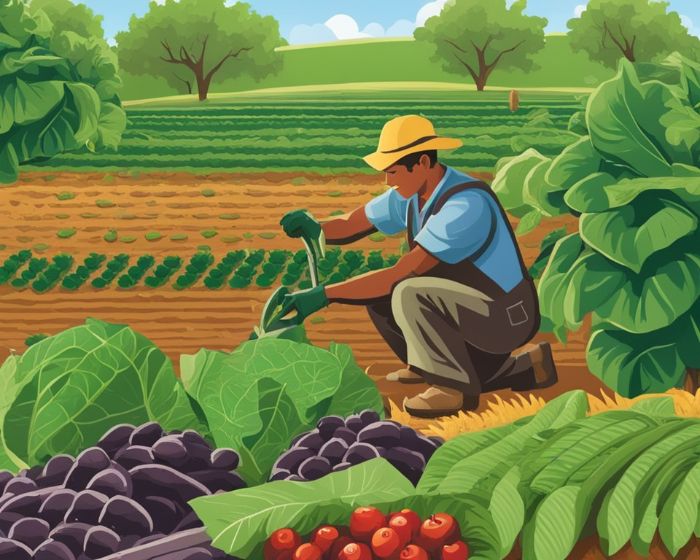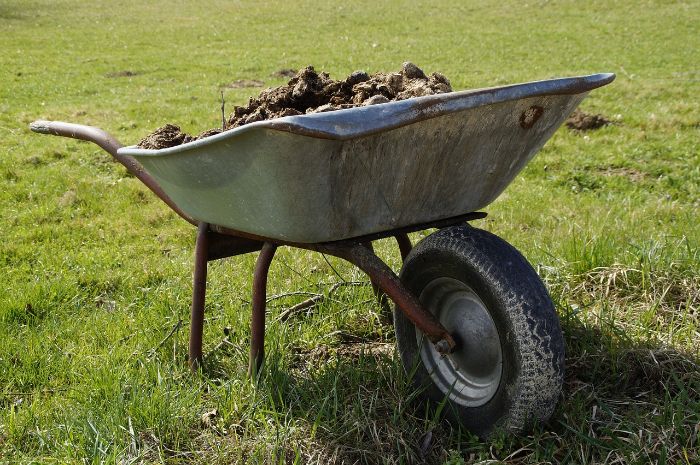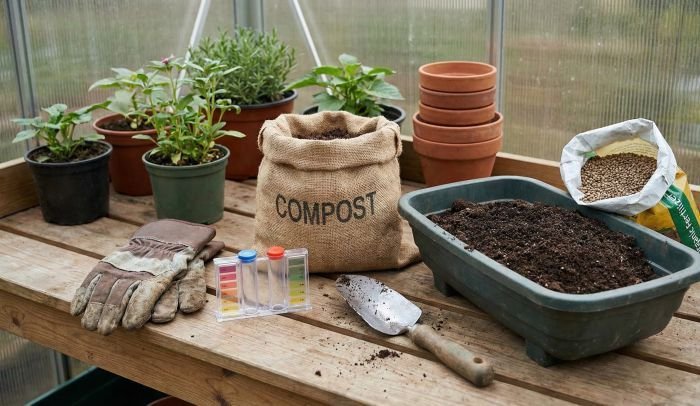Can plants we don’t harvest hold the key to lasting farms and colorful gardens? Green manures, also known as cover crops, greatly boost the health and richeness of the ground. They’re purposely grown to be mixed back into the earth. This adds important nutrients and natural materials. So, plants like vetch, clover, and grains make your soil better, fight erosion, and stop weeds.
It’s important to pick the right green manure and plant them properly. When you plant matters too. New plots need seeds early, but for old gardens, it’s better after harvest. Knowing when and how to mix these back into the earth lets you get the most out of them.
Key Takeaways
- Green manures significantly boost soil fertility and structure.
- They help mitigate soil erosion and suppress weeds naturally.
- Effective use requires knowledge of planting techniques and timing.
- Green manures release essential nutrients, particularly nitrogen.
- Early sowing is optimal for new plots, post-harvest for established gardens.
Table of Contents
Introduction to Green Manures
Green manures are big in farming. They work wonders for the soil. They are crops like legumes, grains, and buckwheat. These not only add nutrients back to the soil but also boost soil health. This leads to better crops.
What Are Green Manures?
Green manures are special cover crops. They’re grown to make the soil better. For example, legumes like vetch and grains such as oats. They change the soil by adding good stuff like organic matter and important nutrients like nitrogen. This makes them natural soil boosters.
Their roots also better the soil’s structure. And their top parts help stop weeds and soil from washing away.
Historical Use of Green Manures
Green manures have been around for a long time. People have been using them for hundreds of years. They were great for starting new farms, fixing tired soil, and keeping weeds down. Legumes are super helpful. They work with special bacteria to pull in nitrogen from the air. This makes the soil rich for other plants.
As time went on, using green manures became a key part of good farming. It showed that they are really valuable for keeping soil healthy.
Benefits of Green Manures
Green manures help a lot with soil care and keeping farms healthy. They improve soil, stop soil from washing away, help fight off weeds, and add to the stuff in the soil that plants like.

Improving Soil Fertility
Green manures make the soil more nutritious. They add nitrogen and other key nutrients that plants need. This makes the soil better for crops like clover and vetch to grow well in.
Enhancing Soil Structure
Green manures work wonders for soil structure. More tiny living things in the soil mean it’s not as tightly packed. This helps soil hold more good stuff for plants and makes it healthier overall.
Suppressing Weeds
Green manures are great at keeping weeds at bay. They grow fast, taking in the resources that would feed weeds. Their thick growth also shades out weeds, keeping the farm looking tidy and productive.
Preventing Soil Erosion
Green manures play a big role in stopping soil from washing away. Their roots hold the soil in place, stopping it from running off. This keeps the topsoil safe and the farmland healthy for the long haul.
Types of Green Manure Crops
Green manure crops come in two main types, leguminous and non-leguminous. Each type helps the soil in different ways and supports sustainable farming. By knowing about these crops, farmers can choose the best ones for their land and needs.
Leguminous Green Manures
Leguminous green manures, like clover and beans, can fix nitrogen from the air. They work with special bacteria to do this. This process helps improve soil without using many chemicals. These crops also add organic matter when they’re mixed back into the soil after they grow. This means more nutrients for the next plants.

Non-Leguminous Green Manures
Non-leguminous green manures, like rye and oats, have their own benefits. They can’t fix nitrogen like legumes. But they do help add organic matter to the soil. They also make the soil better for planting by controlling weeds and protecting against erosion. So, they’re key in keeping soil healthy, especially in colder months.
Best Choices for Different Climates
In choosing green manure, climate plays a big role. Some crops do better in cooler weather, like clover and vetch. Others, like alfalfa and beans, prefer warmth. Knowing what grows well in your area means making the soil healthier. This leads to better and more sustainable farming.
How to Use Green Manures in Your Garden
Green manures are simple and good for your garden. They help improve the soil. They make your garden better for plants to grow.
When to Plant Green Manures
It’s important when you plant cover crops. In a new garden, plant them in spring. This gives them time to make the soil better. For old gardens, plant them in autumn. This gets the soil ready for the next year’s plants.
Planting Techniques and Tips
When planting green manures, sow the seeds thickly. This helps beat the weeds. Also, mow them before they have seeds. This keeps your garden under control. If planting legumes, let them grow for a full season. This makes sure they help the soil as much as possible.
Incorporating Green Manures into the Soil
Putting green manures in the soil needs good timing. If they die in winter, turn them under in early spring. This readies the soil for new crops. For green manures that are still alive, mix them into the soil two weeks before planting. This gives them time to break down and make the soil better.
Seasonal Planning for Green Manures
Choosing the right crops for each season is key in green manure planning. This method helps the soil stay healthy and productive all year. When you pick crops that match the season, you can get more nutrients, protect the soil, and control weeds.
Spring and Summer Green Manures
For spring and summer, buckwheat and millet work well as green manures. They grow quickly, pulling in nutrients and adding organic matter to the soil. These crops also stop weeds by growing a thick cover that doesn’t let them get sunlight and space to grow.
Fall and Winter Green Manures
In fall and winter, it’s best to use rye and vetch as green manures. They keep the soil from washing away in rainy or cold weather. They also soak up extra nutrients, stopping them from washing out of the soil. This helps keep the soil rich for plants the next season.
Crop Rotation and Green Manures
Green manures mixed with crop rotation have big benefits. Switching the types of green manures can stop the soil from getting tired and pests from getting too comfortable. This caring for the soil all year means healthier plants and a more fruitful garden.
Green Manures and Sustainability
Green manures help in sustainable gardening by boosting soil health naturally. They cut down the use of chemical fertilizers. These crops are crucial for both gardeners and farmers.
Reducing the Need for Chemical Fertilizers
Green manures are great at making the soil rich in nutrients, like nitrogen. When they break down, they give plants what they need to grow. This means less synthetic fertilizers are needed, a big win for the environment.
Enhancing Biodiversity
They also work wonders for bringing more life to the farm. Green manures help a lot of helpful bugs, tiny creatures, and other soil friends to live there. This makes the place more balanced and stronger, helping everything to grow better.

Promoting Sustainable Agriculture
For sustainable farming, green manures are a must. They keep the soil healthy over time by adding natural material and making the soil better. This leads to less harm to the planet, saving things like water and energy. Using green manures shows how much good organic farming can do in the long run.
Practical Tips for Home Gardeners
Adding green manure to your home garden helps soil and plants. Start by getting top-notch organic seeds. Local climate info helps pick the right ones for your garden.
Sourcing Green Manure Seeds
It’s key to find good organic seeds for home gardening. Look at local nurseries or online shops like Johnny’s Selected Seeds. Quality seeds set a strong base for your green manure use.
DIY Green Manure Projects
DIY projects are fun and good for green manures. Mix clover or vetch with rye or oats. This helps soil a lot and is cost-effective. Try different mixes to boost soil nutrients.
Monitoring and Adjusting Green Manure Use
Keep an eye on your green manure crops. Watch how they affect weeds and soil quality. This helps you make better choices for the next planting season.
Using green manure wisely makes soil better and plants stronger. It’s great for your garden’s health and growth.
Common Misconceptions about Green Manures
Green manures often fight myths that hide their real benefits. Breaking these misconceptions is key to better farming and greener practices.

Myths vs. Facts
Some say green manures don’t work as well as chemicals. But the truth is they do a lot. They make the soil better, add important stuff to it, and give plants what they need to grow. Plus, they help the earth and its creatures in the long run.
There’s a myth that green manures cause more weeds. That’s not true. If you plant them right, they stop weeds from growing. Green manures take away the things weeds need and cover the ground, stopping more weeds from coming.
Addressing Concerns and Misunderstandings
Some think using green manures is hard or a lot of work. But adding them to your farming isn’t that tough. You just plan it with your crops and it’s good for the soil. You don’t need fancy stuff to use them, just the basics.
Teaching about green manures is really important. By telling people the truth about them, we can make them more popular. Using green manures helps make our farms better for the future.
Conclusion – The Future of Green Manures in Gardening
Green manures are a key part of the future of gardening. They are important for healthy soil without using chemicals. By making soil better, they help our planet stay green.
Learning about different green manure plants is making them more popular. It’s important to teach people how to use them in their gardens. This helps everyone to have better and healthier plants.
Green manures are becoming more important in farming worldwide. People are choosing ways to farm that are good for the Earth. Green manures are a big part of this.
Using green manures is a big step towards better farming for the long term. It helps not just one garden, but the whole ecosystem. For the future, it’s a very smart way to care for our planet.
FAQ
What are green manures?
Green manures, or cover crops, are plants grown for soil benefits. They reduce erosion, boost nutrients, and fight weeds. They do this by giving the soil organic matter and nitrogen when mixed in.
How do green manures improve soil fertility?
Green manures up soil fertility by adding nitrogen and other important nutrients. They bring more life to the soil, making it better for growing plants.
In what ways do green manures enhance soil structure?
They make the soil’s structure better by boosting life in the soil and making it easier for water and roots to move. This is good for next season’s crops.
How do green manures prevent soil erosion?
Plants in green manures make roots that hold the soil together. This prevents it from washing away, especially when it rains hard.
How does climate affect the choice of green manure crops?
Climate is big in picking the right green manure. Some types do better in cold or warm weather. This affects how much they help the soil and other plants.
How do you incorporate green manures into the soil?
To mix green manures in, turn them over when they are no longer growing strong. Do this before they can make seeds. This helps the soil get ready for new plants.
How do green manures benefit crop rotation?
They keep the soil healthy, stop weeds and pests, and help the next plants grow strong. They fit right in with other plant needs.
Where can home gardeners source green manure seeds?
Seeds can be found at garden shops, online stores with natural seeds, and places that focus on seeds suitable for local weather.
What are common misconceptions about green manures?
Some people think green manures don’t work as well as chemicals or can make weeds. But with care, they bring big pluses to the soil and stop weed problems.










